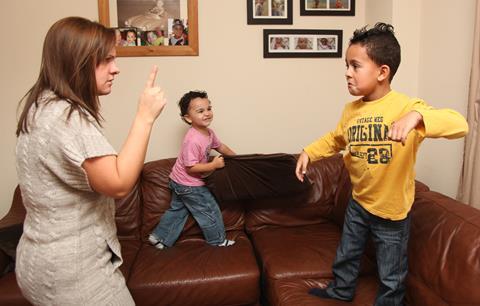As the NSPCC joins calls for a ban on smacking children in England, Hannah Wickens, who grew up with the Dr James Dobson school of discipline, shares her view after becoming a parent.

With the recent resurgence of the decade-long dispute over banning smacking, my own thoughts on corporal punishment within the home have been recapitulated. Recently doctors reignited this discussion with concerns of long-term physical and mental damage being inflicted on children, as documented on the BBC website.
Years ago, I was a fully-fledged convert to smacking, even to the extent that aged 14 I joined my mother for a radio program to talk of the virtues of smacking, as a recipient of such punishment. At the time, I was in the throes of compliant adolescent, eager to please and without thoughts beyond the narrative fed to me by my parents.
I don’t attribute blame to my parents, as keen as they were to set us on the perceived right pathway, one that was entrenched in the Dr James Dobson school of discipline who, from his own revelations, convinced countless Christian families that they should use corporal punishment. And I believed his revelation to be true too, having a limited understanding of what loving discipline meant in this regard.
Dobson used the scripture ‘Spare the rod, spoil the child’ as the premise of his rhetoric, explaining it in literal terms that a parent should use a rod to spank to avoid raising a spoilt child
Dobson used the scripture ‘Spare the rod, spoil the child’ (Proverbs 13:24) as the premise of his rhetoric, explaining it in literal terms that a parent should use a rod to spank to avoid raising a spoilt child. At face value this verse seems to not need further clarification. Having received the marks of a rod on my derriere and discussed the ‘why’ behind its administration with my mother, I was sure it was a legitimate and beneficial form of discipline. I articulated my consent on a broadcast.
Throughout my young adult life, I expressed support of spanking as a form of discipline if the topic arose in dinner party chat. It was only as I had children of my own that I began to wrestle with these scriptures. I discussed my childhood learnings with my husband who agreed, having had a similar upbringing. Together we decided that we had to equally ensure our children were raised according to the Word of God, as we understood it.
Throughout my young adult life, I expressed support of spanking as a form of discipline if the topic arose in dinner party chat, and it was only as I had children of my own that I began to wrestle with these scriptures.
However, we didn’t enforce this way of correcting our girls, as my conscience couldn’t bear the weight of it. I questioned inflicting pain with hands that were meant to demonstrate love. It seemed to be a contradiction. And the further I delved into child psychology, the more dichotomous my thinking, understanding that fear-inducing discipline corrodes trust and is a form of control that may incite rebellion. Therefore, I asked the Holy Spirit to speak to me so that I could reconcile his word with my studies.
The revelation I received changed everything. I began to think about Psalm 23, scripture we recite as a family each evening. One line was highlighted in my mind ‘Your rod and your staff they comfort me’. Previously I thought this an unattractive image and certainly didn’t find consolation in it. I researched the verse and found that ‘rod’ is consistently misinterpreted; it’s a source of protection as the shepherd wards off predators with it. God defending us from our enemies with a rod, a comforting thought for us as his protected sheep. The Hebrew word for rod is ‘Shavat’ and is used in various passages including the original verse of not spoiling the child, which I now understood to mean protecting our children from harm to save them from any influence or actions that may corrupt them.
Furthermore ‘shavat’ is also translated as ‘scepter’ and King Solomon, who wrote about not sparing the rod, would have meant it within the context of using his scepter to govern justly, asserting his authority wisely, thereby saving many from disaster.
These transformational revelations deepened my resolve to eschew the discipline I had received as a child. Harsh correction using spanking cultivates an atmosphere of fear within the home, the opposite of what God intends for his children. God’s perfect love casts out fear and I daily ask for an in-filing of his love to enable me to love my girls as he has asked me to, aware that as a parent I’m a main representation of the Godhead to them. I’m grateful to have now reconciled the psychological and spiritual truths in my heart and that my husband agrees, as we use our metaphorical rod to protect our children.































3 Readers' comments